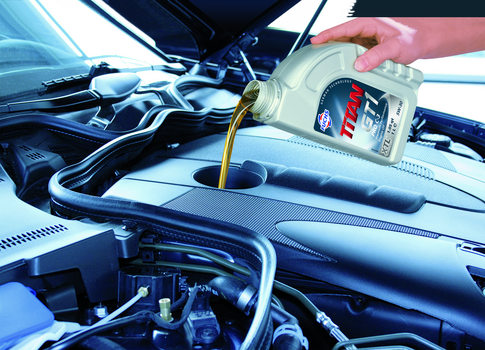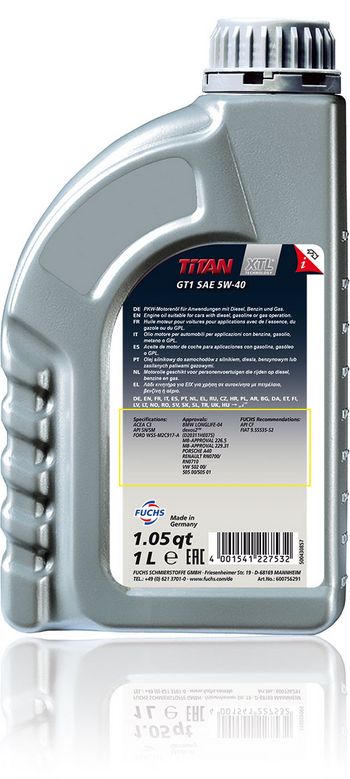Why is it important to use the right oil for your engine?
Any combustion engine requires engine oil to properly function. The engine oil must be the right oil for the respective engine, and it needs to be changed regularly.
But why is that?
What happens if the wrong oil is used?

Engine oil must lubricate the various parts of an engine to reduce friction and minimize unnecessary loss of power. A well lubricated engine will burn fuel more effectively and therefore perform better. Lubrication, however, is just one task. As friction is reduced, the parts and surfaces being subject to friction are protected. The amount of wear is minimized so that the parts have a longer lifetime. A good engine oil also prevents unwanted chemical reactions on the surface of engine parts, for example corrosion. Corroding parts typically lose functionality and lead to increased engine emissions.
Even with the right oil in place, a certain degree of abrasion at the point of contact between different parts surfaces cannot be completely avoided (and in fact is not even wanted in many cases). Consequently, particles are released. The oil ensures these particles are flushed to places where they do not harm the engine. Ideally, the lubricant even dissolves impurities and deposits. It also has a cooling function, in that the oil absorbs the friction heat developing in an engine. Without it, engine parts would overheat and could not continue performing their tasks properly.
A good engine oil fulfills all the above tasks!
Today modern engines are different from each other and there is no one-size-fits-all engine oil that suits all modern engines. For example, modern engines will need a lighter viscosity (thinner) oil in or to realize their full fuel-economy potential. These lighter engine oils are designed to protect the hard working parts of the engine while allowing the engine to spin freely with the least possible resistance.
TITAN GT1 EVO SAE 0W-20 is such an engine oil and was chosen as the very first 0W-20 to be initially filled into any major OEM at the factory. This oil makes use of FUCHS’ proprietary XTL® Technology (eXtreme Temperature Lubrication Technology) for added low and high-temperature performance as well as greatly improved fuel efficiency.
Leaving the choice of an appropriate engine oil to car owners can be confusing and overwhelming to many people. To help, car manufacturers gather all of the requirements an engine oil needs to fulfill for a given model and publish them. This is called an engine oil specification (e.g., GM dexos1TM) and is defined in each car’s manual. Car owners can quickly look up which specification is required for their car and the oil their engine needs.
In addition, Industry Bodies such as the American Petroleum Association (API) or the International Lubricants Standardization and Approval Committee (ILSAC) publish standardized specifications that some OEMs refer to (e.g., API SP or ILSAC GF-6).
Oil producers, on the other hand, can develop their oils according to these specifications. By law, they must show on the bottle which specifications an engine oil fulfills so that consumers can easily choose an appropriate oil. Many car manufacturers even approve oils for their respective vehicles. Only an approval gives car owners certainty about the suitability of an oil, as it is not just a self-proclaimed performance level but a quality confirmation by an outside party. This is especially important for European makes such as Mercedes or VW, as these manufacturers typically have OEM and even model-specific requirements going far beyond standardized industry standards.
Using the wrong engine oil can have significant consequences. The engine can lose power, it can become noisy or - worst-case scenario - it can completely break down.
FUCHS is therefore very transparent about the performance profile of all our products. In order to make it as easy and safe as possible, we clearly state, for which specifications every oil is approved, which specifications are fulfilled completely, and for which applications we recommend usage based on technical expertise and in-house testing.

In addition, we encourage everyone to look up the right oils for their vehicles with our easy-to-use online Oil Chooser
Your FUCHS representative can assist with selection considering all of your unique requirements. Feel free to contact us at any time.
All Blog Posts
- Why is it important to use the right oil for your engine?
- TITAN CARGO - A new engine oil for new requirements
- Lubricating grease and its dropping point
- Lubricants & Technology – SOLCENIC Success
- What you need to know about Food Safety Modernization Act (FSMA) and Lubrication
- Part 2 - How to keep your parts in good condition with In-Process Corrosion Protection
- How to keep your parts in good condition with In-Process Corrosion Protection
- Four rules of thumb in lubrication – your shortcut to savings!
- A gaze into the world of cutting fluids
- When lubricants ‘get chatty’
- Did you know…? About hydraulic fluids
- Did you know…? About vehicle lubrication
- The rapidly evolving automotive industry
- Higher productivity and profitability in four stages
- Ten tips that deliver big time